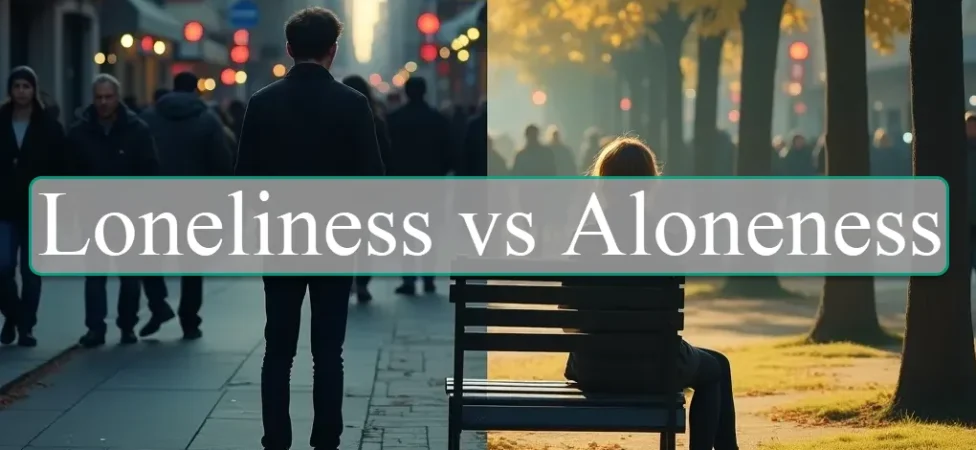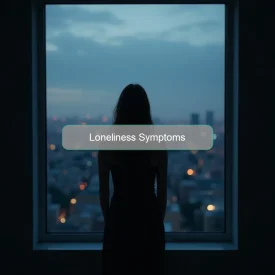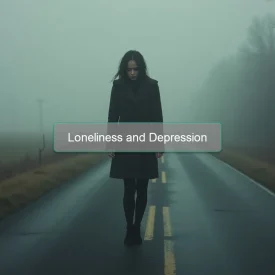We often use loneliness and aloneness as if they mean the same thing — but they are very different experiences. Understanding this distinction is essential for mental health, personal growth, and navigating today’s fast-paced, highly connected world.
Loneliness is usually painful and unwanted, while aloneness can be empowering and enriching. Learning to tell them apart helps us reduce emotional distress and discover the benefits of solitude.
For me, the difference became clear when I moved to a new city. In the first few months, I felt lonely because I hadn’t built connections yet — the days felt heavy and isolating. But later, when I chose to spend weekends reading in a café or walking alone in the park, I realized that aloneness could actually feel peaceful and empowering.
Key Takeaways
- Loneliness is unwanted disconnection, while aloneness is chosen solitude that can feel empowering.
- Loneliness increases risks for stress, anxiety, and depression, but aloneness often improves peace of mind and resilience.
- Mindset matters: how you view being alone shapes whether it feels harmful or healing.
- Healthy aloneness boosts self-awareness, creativity, and emotional independence.
- Loneliness can be transformed into growth by building meaningful connections, practicing mindfulness, and engaging in purposeful activities.
What Is Loneliness?
Loneliness is more than just being physically alone. Psychologists define loneliness as the distressing experience that occurs when a person’s social relationships are perceived as deficient, either in quantity or quality

Emotional and Psychological Impact of Loneliness
- Increases stress and sadness
- Can lead to feelings of emptiness or low self-worth
- Makes it harder to focus, relax, or feel motivated
To better understand these feelings and find ways to manage them, visit our guide on feeling lonely.
Causes of Loneliness
Loneliness doesn’t come from just one source — it often builds from different situations in life. Sometimes it’s about being physically alone, and other times it’s about feeling disconnected even when people are around.
Understanding these causes can make it easier to recognize loneliness and take steps to address it. For a detailed look at the underlying reasons why we feel lonely and how to overcome them, see our resource on Causes of Loneliness.
- Social isolation means having limited contact with others.
This happens when someone doesn’t have many chances to interact with people, like living alone, working from home, or being far from friends and family.
To explore this topic further, learn more in our article about social isolation.
- Lack of meaningful connections refers to having surface-level interactions without depth.
Sometimes, people may have company but still feel lonely if their relationships don’t feel deep, supportive, or genuine.
- Life transitions and changes include events like moving, divorce, retirement, or loss.
Big life changes can lead to loneliness because they often disrupt our routines and social circles, leaving us feeling disconnected.
What Is Aloneness?
Aloneness means simply being by yourself, without it carrying negative emotions. Unlike loneliness, aloneness can feel calm and freeing.

The Positive Side of Aloneness
Being alone doesn’t have to feel bad — it can be a healthy and positive time. Spending time alone can help you recharge your energy and feel more in control of your day. It also gives you the chance to think deeply, plan for the future, or come up with new ideas.
Why Aloneness Is Not the Same as Loneliness
Loneliness and aloneness may sound similar, but they are very different. Loneliness is when you feel disconnected from others and wish you had more connections. Aloneness, on the other hand, is usually a choice — it means spending time alone in a way that feels peaceful and helps you feel better.
Loneliness vs Aloneness: Key Differences
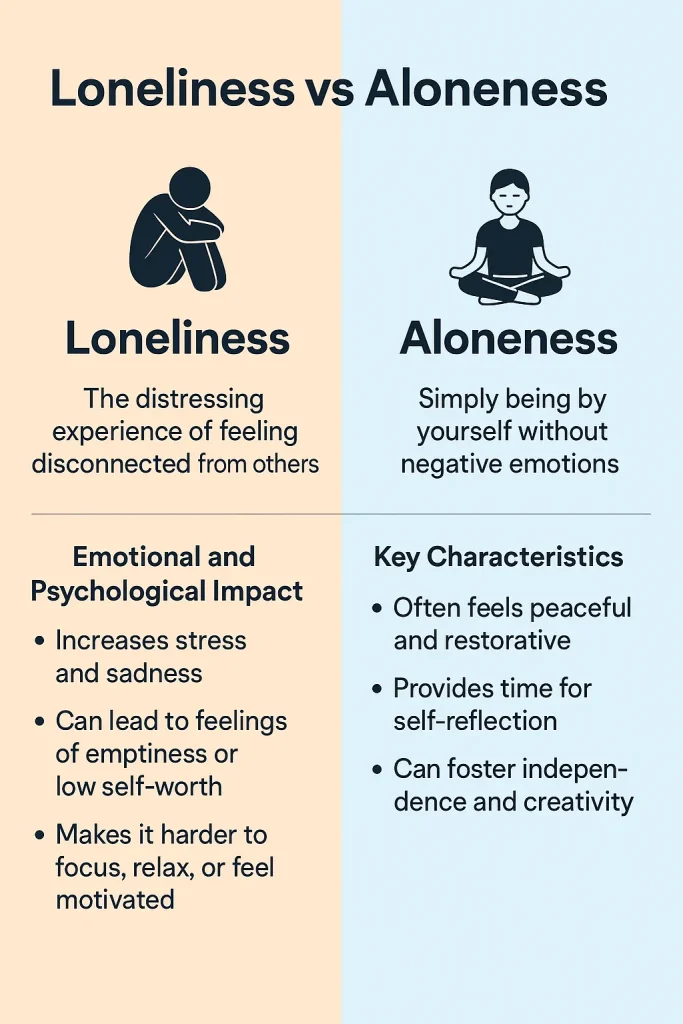
Knowing the key differences between loneliness and aloneness can help you better understand your feelings and how they affect your well-being.
Although they both involve being alone in some way, they affect your emotions, health, and personal growth very differently.
Emotional Experience
Loneliness often feels heavy and sad. It can drain your energy and leave you feeling empty or isolated.
In contrast, aloneness feels light and peaceful. It’s a quiet time that often refreshes your mind and lifts your spirit.
Choice vs Circumstance
Loneliness usually happens when life forces you into disconnection, like losing friends, moving away, or feeling left out.
You don’t want to be alone, but circumstances make it hard to connect. Aloneness is mostly a choice—you decide to spend time by yourself to rest, think, or recharge.
Effects on Mental Health
Loneliness can take a toll on your mental health. It often increases feelings of anxiety, sadness, or depression. On the other hand, aloneness can be good for you—it helps reduce stress, calm your mind, and build emotional strength to face life’s challenges.
Relationship With Personal Growth
Loneliness can make you withdraw from others, blocking your chances to grow emotionally or socially.
Aloneness, however, encourages self-discovery. When you spend time alone by choice, you often become more independent and learn a lot about yourself.
The Psychology Behind Loneliness and Aloneness
To truly understand loneliness and aloneness, it helps to look at what happens in our minds and bodies. Our brain, thoughts, and culture all influence how we feel when we are alone.
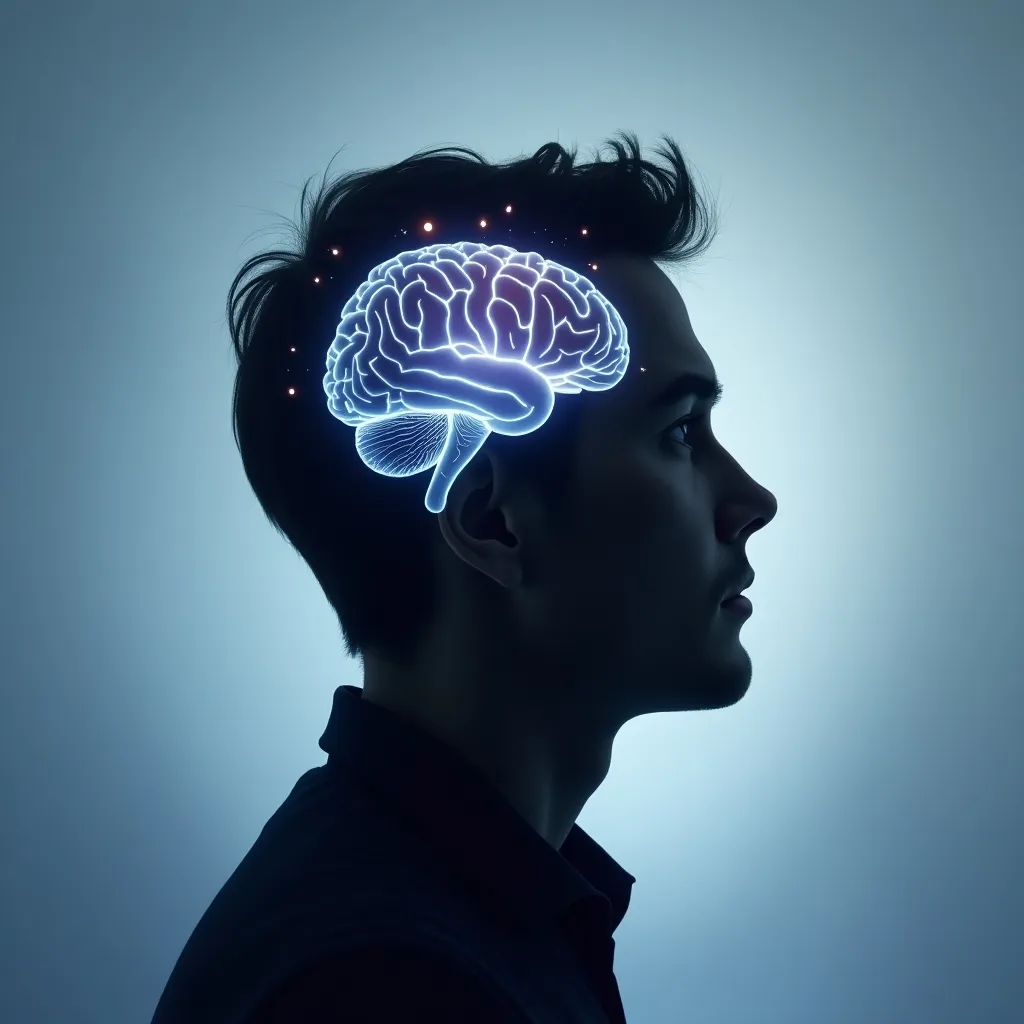
This section explores these psychological and cultural factors to give a deeper view of the two experiences.
How the Brain Responds to Social Isolation
When someone feels lonely for a long time, the brain reacts by turning on the body’s stress systems. It releases a hormone called cortisol, which is sometimes called the “stress hormone.”
This makes the body feel like it’s in danger, even when there is no real threat. As a result, the heart may beat faster, blood pressure can rise, and it becomes harder to relax.
Over time, this constant stress can harm both physical health and mental well-being, making it harder to think clearly, sleep well, and feel happy.
The Role of Mindset in Experiencing Being Alone
How you think about being alone plays a big role in whether the experience feels positive or negative.
If you see aloneness as a punishment or a sign of rejection, it can create feelings of loneliness. But if you view it as a time for rest and self-care, it can help you grow and feel more peaceful.
Cultural Perspectives on Solitude vs Loneliness
Different cultures see solitude in different ways. In many Western societies, being alone is sometimes viewed negatively or as something to avoid. But in many Eastern traditions, solitude is valued highly and connected to wisdom, balance, and finding inner peace.
Benefits of Embracing Aloneness
Spending time alone can bring many positive changes to your life. When you learn to enjoy your own company, you can better understand yourself, feel more creative, and become emotionally stronger.
Here are some key benefits of embracing aloneness:
- Improved self-awareness helps you get to know your own thoughts and feelings more clearly. This deeper understanding can guide you to make better decisions and respond to challenges in a healthy way.
- Boosting creativity and productivity happens because being alone reduces distractions from other people. This quiet time allows your mind to focus deeply, helping you come up with new ideas or get work done more effectively.
- Strengthening emotional independence means relying less on others to feel happy or fulfilled. When you enjoy your own company, you build confidence and learn that your well-being comes from within.
Negative Effects of Prolonged Loneliness
Feeling lonely for a long time can hurt both your mind and body, according to the U.S. Surgeon General’s advisory. It is more than just an unpleasant feeling — it can cause serious problems if not addressed.

Here are some of the main negative effects loneliness can have:
- Mental health risks increase when loneliness lasts. People who feel lonely often have a higher chance of developing depression, anxiety, or other emotional struggles. These feelings can make everyday life much harder.
- Physical health consequences can also happen because loneliness causes stress in the body. This stress may lead to problems like a weaker immune system, making it easier to get sick. It can also disturb sleep, which is vital for good health.
- Impact on social relationships is another important issue. When someone feels lonely for a long time, it can become difficult to trust or connect with others. This may create a cycle where loneliness makes it harder to build or keep close friendships.
How to Transform Loneliness Into Healthy Aloneness
Loneliness can feel painful, but it doesn’t have to stay that way. By changing the way you relate to being alone and taking positive steps, you can turn loneliness into a healthier, more peaceful experience.

Here are some ways to make that change happen:
Building Self-Compassion and Acceptance
When you feel lonely, it’s easy to be hard on yourself. Instead of criticism, try showing yourself kindness and understanding.
Accept your feelings without judgment and remind yourself that everyone experiences loneliness sometimes. This gentle approach helps reduce negative thoughts and opens the door to healing.
Developing Meaningful Connections
Not all relationships are the same. Focus on building a few close connections that truly support and understand you.
It’s better to have quality friendships where you feel valued than many shallow ones that leave you feeling empty. Taking time to nurture these connections can reduce loneliness and create a sense of belonging.
Mindfulness and Meditation Practices
Practicing mindfulness or meditation helps you stay present with your thoughts and feelings without getting stuck in negative stories about being alone.
These techniques calm your mind, reduce stress, and stop rumination — the habit of overthinking problems — making loneliness easier to manage.
Engaging in Purposeful Activities
Doing things that matter to you can change how you experience alone time. This could be hobbies you enjoy, volunteering to help others, or learning something new.
Purposeful activities give you focus, build confidence, and turn loneliness into a feeling of empowerment and growth.
Tips for Cultivating Healthy Aloneness in Daily Life
Spending time alone can be a healthy and positive part of life, but it takes practice to make aloneness feel peaceful instead of lonely.
Here are some practical tips you can use every day to enjoy and cultivate healthy alone time:
Setting Boundaries for Alone Time
It’s important to set aside time for yourself and stick to it. Schedule moments of solitude during your day without feeling guilty. This helps you recharge and keeps your energy balanced so you can show up fully for others when needed.
Journaling and Self-Reflection
Writing down your thoughts and feelings can help you understand what’s going on inside. Journaling allows you to process emotions clearly and track your personal growth over time, making alone time more meaningful.
Digital Detox and Unplugging
Taking breaks from screens and social media reduces overload and constant distractions. Unplugging helps you enjoy quiet stillness and be more present with yourself, which is essential for healthy aloneness.
Focusing on what you are thankful for, even while alone, can improve your mood and shift your mind toward positivity. Gratitude helps you appreciate solitude as a gift rather than a burden.
Exploring AI Companions
For some, AI companions can offer a form of connection that supports healthy aloneness. Tools like an AI girlfriend provide friendly interaction and emotional support when human company is limited.
To learn more about this new type of companion, you can read about What is an AI girlfriend to see how it might fit into your life.
When Loneliness Becomes a Concern

Loneliness can sometimes become overwhelming and start to affect your mental and physical health.
Knowing when loneliness is more serious can help you take the right steps to get support and feel better.
Signs That Loneliness Is Affecting Mental Health
Loneliness that lasts for a long time can cause persistent feelings of sadness or hopelessness. You might also begin to avoid friends and stop doing activities you used to enjoy.
Other common signs include trouble sleeping, difficulty focusing, or feeling tired all the time. These changes show that loneliness is impacting your well-being.
When to Seek Professional Help
If loneliness is making it hard to function in daily life, it’s important to ask for help. Talking to a therapist or counselor can provide guidance and support to manage these feelings in a healthy way.
Seeking professional help is a strong and positive step toward healing.
Support Resources and Communities
You don’t have to face loneliness alone. Joining support groups, online communities, or local organizations can connect you with others who understand what you’re going through.
These resources offer friendship, advice, and a sense of belonging that help reduce loneliness.
Conclusion: Seeing the Difference Between Loneliness and Aloneness
Knowing what makes loneliness different from aloneness can help you take better care of yourself. Loneliness feels painful and unwanted, while aloneness is a calm, positive choice to spend time alone.
Spending time alone in a healthy way can help you feel peaceful, learn more about yourself, and gain confidence. But if loneliness lasts too long, it can harm your health. Changing loneliness into healthy alone time by being kind to yourself, connecting with others, and staying mindful can really help.
If loneliness feels too hard to handle, reaching out for support or trying things like AI companions can bring comfort and connection. Understanding these feelings better lets you live a happier, more balanced life.
Disclaimer
This article is for informational purposes only and does not replace professional medical advice. If loneliness is affecting your health, please consult a healthcare provider.
Frequently Asked Questions
Is being alone always bad?
No. Being alone (aloneness) can actually be healthy and refreshing when it’s chosen. It gives you time for self-reflection, creativity, and rest. Loneliness, on the other hand, is what feels painful and harmful.
How do I know if I’m lonely or just alone?
Ask yourself how you feel when you’re by yourself. If you feel peaceful, productive, or recharged, that’s aloneness. If you feel sad, disconnected, or craving connection, that’s loneliness.
Can aloneness improve mental health?
Yes. Spending intentional time alone can reduce stress, increase focus, and build emotional independence. It allows you to reset and connect with yourself.
Why does loneliness hurt more at night?
At night, distractions fade, and the brain naturally processes emotions more deeply. This makes feelings of loneliness intensify when it’s quiet and still.

